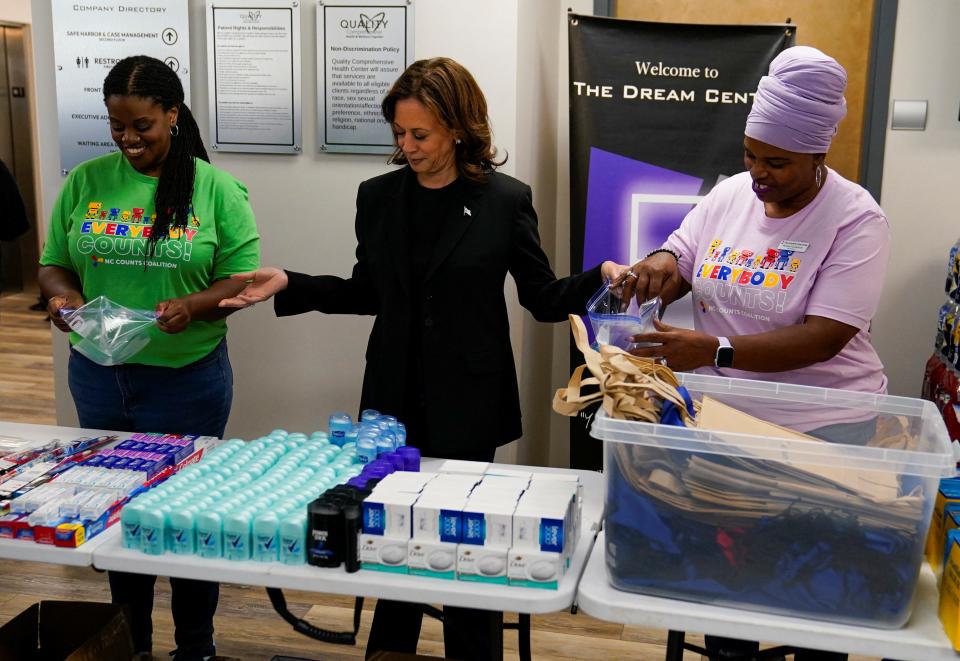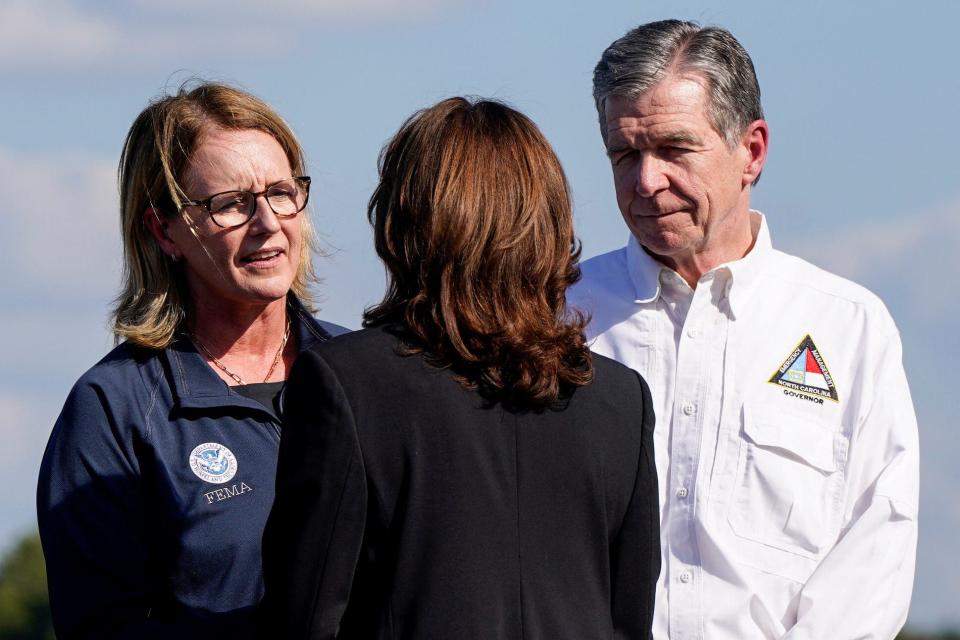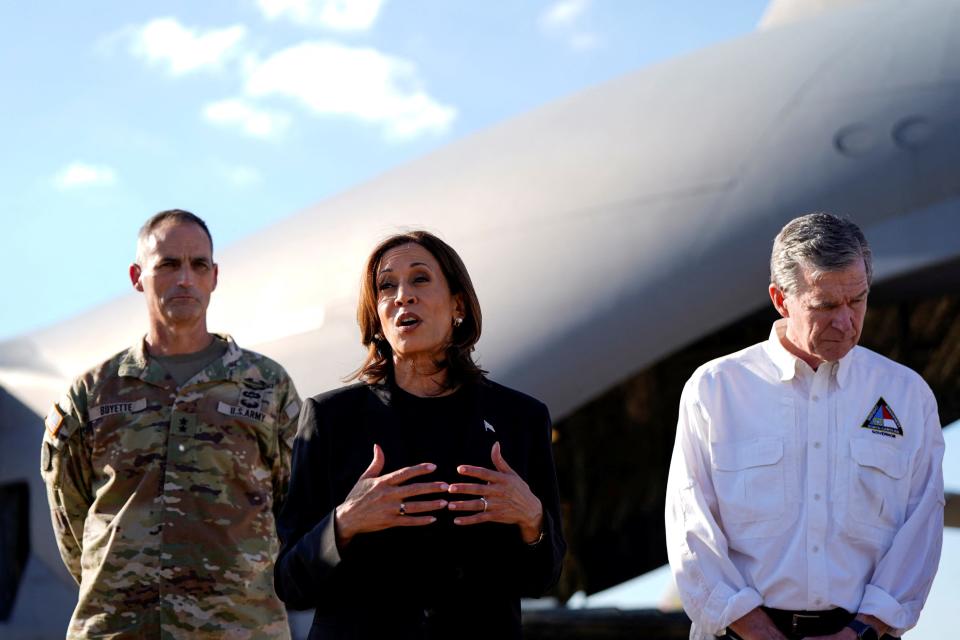Vice President Kamala Harris told an Asheville volunteer leader, “We’re here for the long haul,” and visited North Carolina on Saturday to be briefed on the damage the state suffered from Tropical Storm Helene and to meet with people who dealing with the aftermath of the catastrophic floods.
The record high water tore apart large districts of Asheville and tore through small towns like Swannanoa, Pensacola, Chimney Rock and Lake Lure. Rapidly rising water along the French Broad, South Toe and Cane rivers, among others, washed away trees, cars, buildings and homes.
Harris, the Democratic presidential candidate, flew into Charlotte Douglas International Airport from Joint Base Andrews outside Washington, DC. Greeting her on the tarmac by North Carolina Governor Roy Cooper, state Attorney General and Democratic Governor hopeful Josh Stein, Federal Emergency Management Administrator Deanne Criswell, North Carolina Democratic U.S. Representatives Alma Adams and Jeff Jackson, and Mayor Vi Lyles from Charlotte.

She also met with Asheville Mayor Esther Manheimer during her visit, who later released a series of video statements saying they discussed how the government can support small businesses affected by the flooding and what supplies Asheville will need in the coming months.
“We also talked about the need for long-term rebuilding and that effort and what it will look like,” Manheimer said, including “building back a more resilient” Asheville.
Harris praised local officials and North Carolinians responding to the crisis.
“I have seen and heard the stories from here in North Carolina of strangers reaching out to each other and helping people in any way they need, including shelter, food, friendship and community,” Harris said.
“I think these moments of crisis bring out the best of who we could be and who we are,” she added.
At one stop during her visit, Harris joined staff from member organizations of the NC Counts Coalition, which were putting together care packages for storm victims in Western North Carolina. She told Angelica Wind, Asheville regional director of NC Counts, that she plans to continue supporting the WNC region.
Wind said she and her family came to Charlotte to rest due to the lack of power, water and communications services at home.


“We’re just surviving,” Wind said. “I have my daughter and her friend who came so we could try to live normally for a few days.”
Harris assured her that “we’re here for the long haul. And I’ve met with the governor and the administrator of FEMA is here on the ground.”
Disaster response could be critical in the presidential race


North Carolina is seen as one of the few swing states in the November 5 presidential election. The speed and effectiveness of the Biden administration’s response efforts could have implications for the race between Harris and the Republican nominee, former President Donald Trump.
Trump visited Helene’s victims in another swing state, Georgia, on September 30. Harris also visited Georgia and spoke with victims on Oct. 2 when President Joe Biden joined Manheimer on an aerial tour of the WNC damage.
Securing aid from Congress for disaster recovery is one of the key sticking points as the 2024 presidential race enters its final weeks.
More: Riverfront bar, brewery and cafe owners are determined to rebuild after Tropical Storm Helene


In a letter Friday evening to congressional leaders, Biden warned that the Small Business Administration’s disaster loan program will run out of money within weeks. He also said FEMA’s disaster relief funds could face a shortfall by the end of the year and called on Congress to provide additional resources.
But Republican House Speaker Mike Johnson has suggested that Congress could wait until after the election to pass hurricane relief measures.
In the meantime, the recovery effort is expected to be long and difficult. Cooper has urged tourists not to come to the region, saying: “We don’t want you here unless you directly help with the response.”
During Harris’ visit, he cited the North Carolina Department of Health and Human Services’ current count of deaths attributed to Helene, 68. But local officials say their number is now 115.
I
Including other states, at least 214 deaths have been attributed to Helene, including 72 in Buncombe County, the most populous in WNC. Other counties, such as Yancey and Madison, have also been devastated by flooding, leaving rural residents isolated and small businesses forced to dig themselves out of the mud.
FEMA aid statistics


More: Western NC school, college closures after Helene flood: What we know so far
As the region continues to battle water, power and cell phone outages, here’s what the federal government has provided, according to the White House:
-
$26 million in housing and other assistance to more than 25,000 households in North Carolina.
-
More than 5,400,000 meals and 6,300,000 liters of water.
-
700 FEMA personnel on site.
-
More than 1,200 urban search and rescue personnel, who as of Saturday had rescued or supported more than 3,200 survivors.
It also says that 74% of power outages have been restored.
Will Hofmann is the growth and development reporter for the Asheville Citizen Times, part of the USA Today Network. Do you have a tip? Email him at WHofmann@citizentimes.com. Please consider supporting this type of journalism with a subscription to the Citizen Times.
This article originally appeared on Asheville Citizen Times: Harris visits NC after Helene floods, speaks with Asheville mayor






